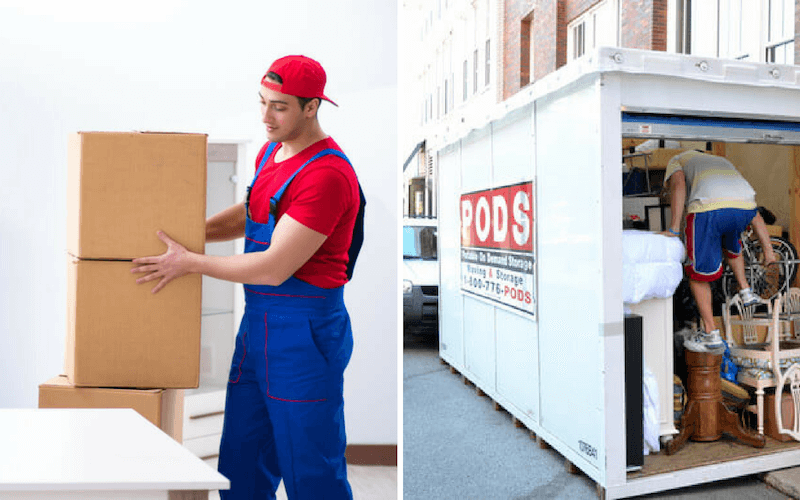Step-by-step walkthrough to hiring the right overseas movers
Comprehending the Inclusions of moving and Freight Forwarding on the planet of Residential and Global Delivery
Guiding through the complexities of moving and Freight forwarding can be tough. Both processes involve distinctive procedures and requirements that are vital for successful transport. Understanding the distinctions in logistics, paperwork, and risk monitoring is necessary for services and people alike. This knowledge can greatly affect the performance and security of shipments. Lots of are not aware of the certain components that affect the overall experience and results. What variables should one take into consideration to guarantee a smooth changeover?
The Essentials of moving and Freight Forwarding
moving and Freight forwarding are fundamental elements of the international logistics market. They facilitate the transfer of products and individual possessions throughout worldwide and residential boundaries. moving mainly includes the moving of people or families, encompassing industrial and household needs. It commonly includes packing, filling, delivering, and unboxing items at the destination. In contrast, Freight forwarding is concentrated on the delivery of goods, typically in mass, making use of various transportation settings, such as sea, land.freight, or air forwarders work as middlemans, coordinating logistics to guarantee timely shipment while navigating via facility laws and personalizeds treatments. Both processes need cautious planning, organization, and communication to guarantee effectiveness and decrease disturbances. Recognizing these basics is crucial for any individual associated with logistics, as they lay the groundwork for advanced facets of delivery and transportation administration.
Secret Parts of Freight Forwarding Services
Freight forwarding solutions incorporate numerous critical parts that assure smooth transportation of goods. Key responsibilities of Freight forwarders include managing logistics, coordinating deliveries, and managing customizeds clearance. Additionally, understanding important delivery paperwork is critical for conformity and efficient movement of freight.
Freight Forwarder Responsibilities
A reliable Freight forwarder plays an essential duty in collaborating the transportation of products, ensuring that deliveries are handled successfully and in compliance with laws. Their obligations encompass numerous key tasks, including selecting ideal transportation courses, negotiating Freight prices, and managing logistics. They function as middlemans in between service providers and shippers, guaranteeing that freight is properly packaged and classified for risk-free transportation. Additionally, Freight forwarders track deliveries, providing updates to clients about the status and anticipated shipment times. They also evaluate and handle threats linked with transportation, advising insurance coverage alternatives as required. By assisting in interaction and documents, Freight forwarders improve the shipping process, minimizing possible hold-ups and boosting general supply chain performance.
Delivering Documents Basics

Comprehending Customs Clearance and Documentation
Precise documentation is important in the customs clearance process, as it assures conformity with various policies. An overview of customizeds guidelines highlights the intricacies dealt with by carriers and Freight forwarders. Common clearance challenges can substantially affect delivery timelines and expenses, making understanding this facet necessary for reliable logistics.
Importance of Accurate Documents
Steering through the complexities of worldwide delivery calls for a keen understanding of custom-mades clearance and the crucial function of documentation. Accurate paperwork is crucial for making sure that shipments adhere to guidelines and reach their destinations right away. Appropriately prepared documents, including expenses of lading, business billings, and packing listings, facilitate smooth interactions with personalizeds authorities. Errors can result in shipment delays, penalties, or even confiscation of goods. Furthermore, thorough paperwork aids in tracking shipments and resolving conflicts. As a result, companies took part in moving and Freight forwarding have to prioritize thorough documentation practices to navigate the complex landscape of international delivery effectively. This persistance not only improves operations but additionally boosts consumer satisfaction by ensuring prompt distribution.
Custom-mades Laws Introduction
Guiding find movers in my area customizeds regulations is an important facet of worldwide trade that straight influences the success of moving and Freight forwarding operations. Effective personalizeds clearance needs an understanding of various policies, consisting of tolls, tasks, and import/export restrictions. Exact paperwork is vital, as it guarantees conformity with legal needs and assists in the effective movement of items across boundaries. Secret papers typically include business invoices, packaging lists, and costs of lading, which offer detailed info about the delivery. Additionally, custom-mades brokers play a vital duty in steering intricate policies, acting as intermediaries in between shippers and custom-mades authorities. By keeping extensive expertise of customs processes, organizations can significantly decrease delays and decrease costs connected with global shipping.
Usual Clearance Challenges
Many obstacles can arise during the custom-mades clearance procedure, usually complicating the motion of items throughout boundaries. One substantial problem is insufficient documentation, which can bring about fines and delays. Exporters and importers need to assure all required documents, such as billings, packaging listings, and certificates of origin, is full and accurate. Furthermore, disparities in appraisal can activate analysis from personalizeds authorities, resulting in extra obligations or assessments. Language obstacles may also position challenges, as miscommunication can cause misunderstandings concerning regulations. Additionally, changes in customs laws can produce complication, demanding consistent watchfulness by carriers. Inevitably, conquering these clearance tests needs comprehensive preparation and a clear understanding of personalizeds requirements to promote smooth international transactions.
Product Packaging and Classifying Requirements
Typically overlooked, packaging and labeling needs play an essential role in the delivery process, ensuring that items are safeguarded and easily identifiable throughout their trip (shipping companies). Correct product packaging safeguards items from damage throughout transit, while also helping with reliable handling and storage. Using proper materials, such as bubble wrap, foam, or tough boxes, can avoid damage and loss.Labeling is equally important. Precise and clear tags convey vital details, including the destination, taking care of guidelines, and contents. Labels have to follow policies certain to worldwide and residential delivery, which might consist of unsafe materials identification or personalizeds go to the website declarations.Moreover, standard labeling techniques streamline the monitoring procedure and boost overall logistics efficiency. By adhering to packaging and labeling demands, services decrease the risk of delays, damage, or misdelivery. Ultimately, these practices contribute significantly to the success of moving and Freight forwarding operations, guaranteeing a seamless shipping experience for all parties involved
Tracking Shipments: Importance and Approaches
Reliable product packaging and labeling established the structure for effective shipment administration, but tracking shipments is equally vital in the shipping process. Shipment monitoring offers real-time presence, which aids customers and businesses monitor the progression of their goods. This openness boosts consumer fulfillment, considering that clients can stay informed concerning shipment timelines and any kind of possible delays.Several techniques help with effective monitoring. Barcode scanning is a typical method, utilizing distinct identifiers to monitor plans throughout their journey. Additionally, general practitioner technology enables precise area tracking, permitting prompt updates and improved logistics monitoring. Lots of delivery companies currently supply digital systems and mobile applications that supply users with very easy access to tracking information.The importance of delivery monitoring can not be overstated; it minimizes the threat of shed or damaged products, boosts operational performance, and fosters count on between recipients and carriers. Integrating efficient monitoring methods is crucial for effective domestic and global delivery procedures.
Insurance coverage Options for Your Item

Protecting insurance for goods en route is a crucial factor to consider for businesses and individuals alike. Insurance policy options differ based upon the kind of delivery, value of goods, and particular dangers entailed. Common types include provider obligation, which covers loss or damages read more while en route, and full-value insurance, offering substantial insurance coverage for the complete worth of the goods.Shippers might additionally take into consideration aquatic insurance for international shipments, protecting against threats related to sea transport. It is necessary to examine the certain requirements of the shipment and evaluate the terms and conditions of any type of policy.Furthermore, comprehending exclusions and limitations is crucial to avoid potential voids in coverage. Carriers must engage with insurance coverage professionals to explore customized remedies that fit their one-of-a-kind scenarios. Eventually, buying the right insurance policy can minimize economic dangers and offer satisfaction throughout the delivery process.
Picking the Right moving and Freight Forwarding Solution
When choosing a moving and Freight forwarding solution, it is crucial for individuals and organizations to thoroughly evaluate their certain needs and priorities. Aspects such as the volume of items, location, and timeline play a substantial role in this decision-making procedure. Researching numerous service providers is advisable; contrasting their services, rates, and client testimonials can expose valuable insights.Additionally, it is essential to consider the experience and competence of the company in handling certain kinds of freight, especially for worldwide deliveries that may entail customizeds clearance. Openness in pricing, including any kind of covert charges, should likewise be scrutinized.Furthermore, reviewing the level of client assistance provided is necessary, as timely communication can alleviate concerns during transportation (shipping companies). Finally, verifying the accessibility of insurance policy options ensures that products are shielded throughout the delivery process. By taking these individuals, steps and companies can make educated options that straighten with their logistics needs
Regularly Asked Inquiries
What Types of Product Can Be Shipped Internationally?

Just How Do Shipping Prices Vary In Between Different Service Providers?
Shipping costs vary considerably between service providers due to aspects such as service speed, freight type, range, and added services used. Each copyright's prices version reflects these variables, influencing total shipping costs for consumers.
Can I Ship Hazardous Materials or Perishables?
Shipping harmful products and perishables is subject to stringent laws. Carriers commonly call for specific packaging, labeling, and paperwork. Carriers should ensure conformity with worldwide and neighborhood regulations to avoid charges and ensure secure transportation.
What Should I Do if My Delivery Is Delayed?
When confronted with a shipment delay, one must initially speak to the service provider for updates. Evaluate any type of notices received, evaluate alternative services, and keep all events educated concerning the circumstance to minimize disruptions.
Are There Weight Boundary for Delivery Containers?
Weight limits for delivery containers vary depending on elements like container dimension and shipping policies. Commonly, standard containers have an optimum gross weight of around 30,000 to 32,000 kgs to assure risk-free transportation and handling. In contrast, Freight forwarding is focused on the shipment of goods, typically in bulk, using various transportation modes, such as air, sea, or land.Freight forwarders act as intermediaries, coordinating logistics to assure prompt delivery while maneuvering via complicated regulations and customs treatments. Secret obligations of Freight forwarders consist of taking care of logistics, collaborating deliveries, and managing custom-mades clearance. A reputable Freight forwarder plays an important duty in collaborating the transportation of products, ensuring that deliveries are dealt with successfully and in compliance with laws. Efficient product packaging and labeling set the structure for successful shipment monitoring, but tracking deliveries is equally necessary in the shipping process. Several delivery business currently provide electronic systems and mobile applications that offer customers with easy access to tracking information.The value of shipment tracking can not be overemphasized; it minimizes the danger of shed or harmed goods, enhances functional performance, and fosters count on in between shippers and recipients.